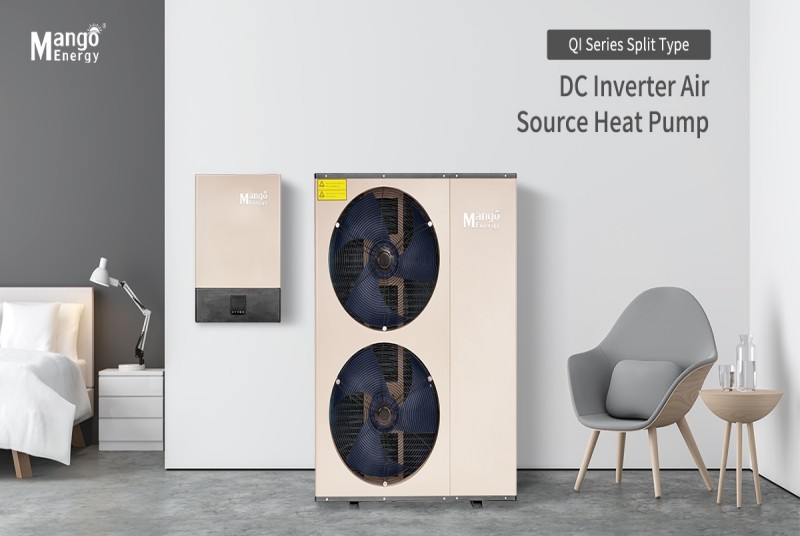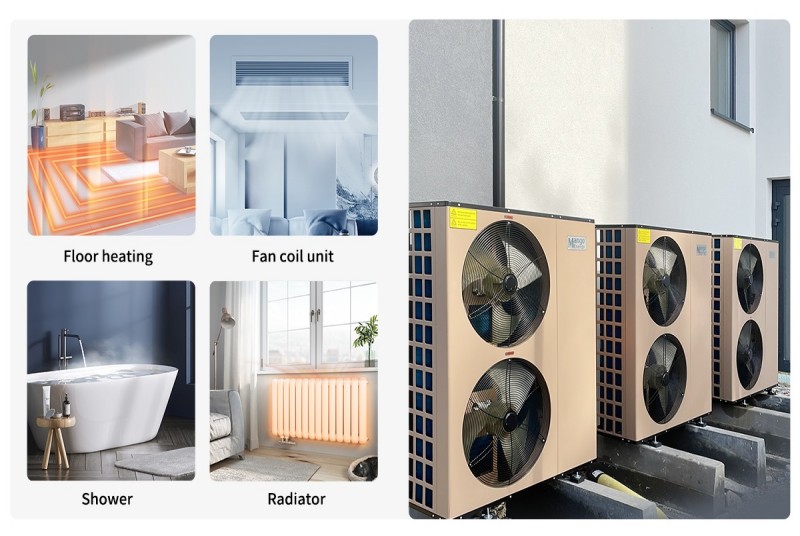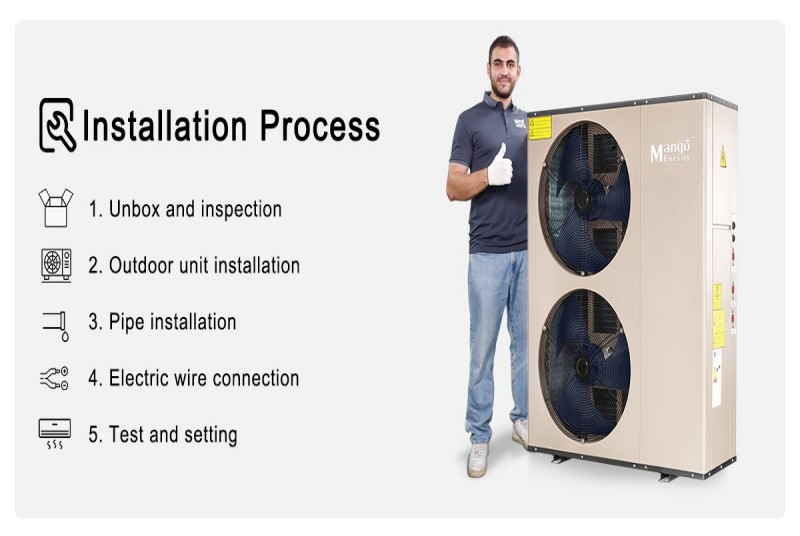
As the demand for efficient heating solutions grows, particularly in regions with harsh winter climates, heat pumps are becoming a popular choice for their ability to provide both heating and cooling in a single system. Among these, DC inverter heat pumps stand out for their high stability and efficiency, especially in low-temperature environments. But what makes these heat pumps more reliable when temperatures drop? In this article, we’ll dive into the technology behind DC inverter heat pumps, exploring why they perform exceptionally well under low-temperature conditions.
Understanding the Basics of DC Inverter Heat Pumps
A heat pump operates by extracting heat from the air (even in cold conditions) and transferring it indoors. Traditional heat pumps face challenges in low temperatures due to the strain placed on their fixed-speed compressors, which must cycle on and off to maintain the desired temperature. In contrast, a DC inverter heat pump utilizes a variable-speed compressor that can adjust its output in real-time according to the heating demand. This means it doesn’t need to constantly cycle on and off, allowing it to operate smoothly and efficiently.
Key Features of DC Inverter Technology
To understand why DC inverter heat pumps excel in low temperatures, it’s essential to know what makes the inverter technology distinct. Here are some of the core features:
Variable-Speed Operation: The DC inverter’s ability to operate at various speeds means it can increase its output gradually rather than forcing the compressor to run at full capacity all the time. This reduces stress on the system, especially in extreme temperatures.
Real-Time Temperature Adjustments: The inverter technology constantly monitors the indoor and outdoor temperatures and adjusts the compressor speed as needed. This adaptability is crucial in low temperatures when maintaining consistent heat output can be challenging for traditional systems.
Energy Efficiency: Since the DC inverter only uses the energy required to reach and maintain the target temperature, it is highly energy-efficient. In low-temperature settings, this efficiency not only saves energy but also improves the system’s overall reliability.

Why DC Inverter Heat Pumps Excel in Low Temperatures
In low-temperature conditions, fixed-speed compressors can struggle as they are forced to repeatedly start and stop, creating excess wear and tear on the components. DC inverter technology addresses these issues in several key ways:
1. Reduced Startup Strain
Starting up in cold conditions can put a significant amount of strain on traditional compressors. The DC inverter heat pump’s variable-speed capability allows it to start gradually, which reduces the initial load on the compressor. This lower startup strain contributes to the unit’s reliability in colder environments, as the compressor doesn’t experience the same wear and tear as a traditional unit.
2. Maintaining Stable Heating Output
As outdoor temperatures drop, the heating demand naturally increases. Unlike fixed-speed systems, which may struggle to keep up, DC inverter heat pumps can automatically increase their compressor speed to meet the demand without cycling on and off. This stability ensures a more consistent and comfortable indoor temperature, even in freezing conditions, which is particularly beneficial for users in colder climates.
3. Improved Defrosting Efficiency
In cold climates, ice can build up on the heat pump’s outdoor coil, requiring defrost cycles to maintain efficiency. DC inverter heat pumps handle defrosting more effectively by precisely controlling the compressor speed and reversing the refrigerant flow to melt the ice. Since the inverter system can adjust rapidly, defrost cycles are shorter and less energy-intensive, meaning the system can return to normal heating more quickly.
4. Energy Efficiency Reduces Power Consumption
Energy efficiency is particularly important in low temperatures because heating demand is typically highest. With a DC inverter heat pump, the variable-speed compressor minimizes unnecessary power consumption, as it only uses as much energy as needed to maintain the desired temperature. This efficiency reduces overall power consumption, saving on utility costs and lessening the environmental impact of heating.

DC Inverter Heat Pumps vs. Traditional Heat Pumps in Cold Weather
Traditional, fixed-speed heat pumps operate on a simple on/off basis: they run at full capacity when the indoor temperature falls below the set point, then turn off once the set temperature is reached. This process becomes inefficient and potentially unstable in low temperatures, as frequent starts and stops put extra strain on the system. In contrast:
DC inverter heat pumps provide a smoother operation with their real-time adjustments, ensuring more stable and efficient performance without constantly turning on and off.
They offer better temperature control by continually adjusting compressor speed, reducing energy waste and avoiding temperature fluctuations.
The adaptability of DC inverter technology allows for quicker adaptation to weather changes, which is invaluable in climates where temperature fluctuations are common.

The Role of Refrigerants in Low-Temperature Stability
The type of refrigerant also influences how well a heat pump operates in low temperatures. Modern DC inverter heat pumps typically use advanced refrigerants, such as R410A or R32, which perform well in extreme conditions. These refrigerants are specifically chosen for their ability to maintain efficiency and stability even in freezing temperatures, supporting the DC inverter’s goal of continuous, reliable performance.
Benefits of Choosing a DC Inverter Heat Pump for Low-Temperature Regions
For regions with long, cold winters, choosing a DC inverter heat pump offers several clear advantages:
Lower Maintenance Costs: Since the DC inverter compressor doesn’t experience as much strain from cycling, it tends to last longer, resulting in fewer repairs and lower maintenance costs over time.
Consistent Comfort: With its ability to maintain stable indoor temperatures, a DC inverter heat pump ensures continuous comfort, even when outdoor temperatures plunge.
Cost Savings on Energy Bills: High efficiency leads to reduced power usage, which translates to significant savings on energy bills, particularly in climates where heating is required for extended periods.
Environmentally Friendly: By consuming less energy and operating efficiently, DC inverter heat pumps reduce carbon emissions, making them a more eco-friendly heating solution.
Conclusion: A Smart Investment for Low-Temperature Stability
When it comes to heating in cold climates, DC inverter heat pumps provide unmatched stability and efficiency. Their advanced technology allows them to adapt to fluctuating temperatures and heating demands, delivering reliable warmth even in the harshest conditions. For anyone seeking a durable, efficient, and environmentally responsible heating option, a DC inverter heat pump is a worthwhile investment that brings comfort and energy savings season after season.



